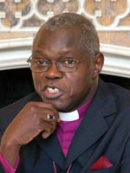Archbishop of York speaks out on Equality Bill

Dr John Sentamu
The Anglican Archbishop of York, Dr John Sentamu, is speaking out in the House of Lords today, to ask that Christian organisations continue to be exempted from employment laws in specific circumstances.
The Archbishop will be supporting Baroness O'Cathain's amendments at 98, 99 and 100, and opposing Government proposals which would look to narrow the law with regard to churches.
The Archbishop will say: "There are, I know, those who struggle with the concept of allowing any exemptions provision for religious organisations in relation to discrimination in the field of employment. But the argument is a very simple one: religious organisations, like all organisations, need to be able to impose genuine occupational requirements in relation to those who serve them.
"Successive legislation over the past 35 years has always recognised the principle that religious organisations need the freedom to impose requirements in relation to belief and conduct which go beyond what a secular employer should be able to require.
"Noble Lords may believe that the Roman Catholic Church should allow priests to be married, they may think that the Church of England should hurry up with allowing women to become bishops. They may feel that many Churches and other religious organisations are wrong on matters of sexual ethics. But, if religious freedom means anything it must mean that those are matters for the churches and other religious organisations to determine for themselves in accordance with their own convictions. They are not matters for the law to impose. Start down that road and you will put law and conscience into inevitable collision. That way lies ruin.
"As Edmund Burke said: 'Bad laws are the worst sort of tyranny.' The onus is on Her Majesty's Government to demonstrate why any narrowing of the provisions in existing legislation under the Sex Discrimination Act 1975 and the Sexual Orientation Regulations 2003 needs to be made. There is absolutely no doubt that paragraph 2 of Schedule 9 to the Bill as introduced would constitute a significant narrowing of the present law for the reasons that I set out at the Second Reading. The Government's Amendment 99A goes some way but does not go far enough to meeting these objections.
"When the House of Lords debated the 2003 regulations, the Minister of State, Lord Sainsbury of Turville said, recorded in Hansard on 17 June 2003: 'We had in mind a very narrow range of employment: ministers of religion, plus a small number of posts outside the clergy, including those who exist to promote and represent religion. The words on the page reflect our intentions ...'
"The wording of amendment 99A is either a departure from those intentions, or fails to satisfy them. We have gone from posts outside the clergy 'including those who exist to promote and represent', to posts that only exist to promote or represent.
"Again, the question is about preserving the status quo and about not introducing legal uncertainty. The 2003 Regulations did not impose a 'proportionality' requirement. That was a deliberate policy decision on the part of Her Majesty's Government.
"Now on the eve of this debate it is suddenly being suggested that the words in the Bill are needed to avoid legal challenge from the European Commission. This is a very puzzling claim when Ministers have insisted all along that the Bill does not narrow the exemption provided in the 2003 Regulations. It is hard to see how both arguments can be true. And it is all the more puzzling given that in 2004 the Government successfully defended the compatibility of the regulations with European law against a challenge from Amicus in the High Court, (Judgement 26 April 2004, paras 88-128).
"Noble Lords are entitled to some explanation as to why the unpublished opinion of officials reached in private in Brussels is to be preferred to the Government's own previous view that was sustained by a High Court judge after all the arguments had been tested in open court and a judgement produced running to 58 pages.
"In the High Court, Her Majesty's Government had argued that it would not be right for courts or tribunals to make judgements about questions of doctrine. Her Majesty's Government was right to take that view in 2003; there is no good reason for it to take a different view now! So why is Her Majesty's Government now dissatisfied with its own, very recent handiwork? Where are the examples of actual abuses that have caused difficulties? Where are the court rulings that have shown that the law is defective? If it ain't broke, why fix it?
"The truth is that there are none because the status quo has been working perfectly satisfactorily. The earlier balances were struck by Parliament very carefully. The right course is to leave them exactly as they are."


















